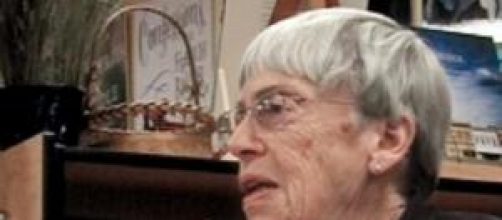The Medal for Distinguished Contribution to AmericanLetters is one of the most prestigious literary honours. It was created in 1988to recognise a lifetime of literary achievement. The 2014 winner of the award isthe American writer Ursula K Le Guin, introduced by Neil Gaiman as a writer who“made me a better writer and much more importantly, she made me a better personwho wrote”.
Her acceptance speech at National Book Awards deeplymoved and surprised the audience. By saying what many are feeling and fearing,Le Guin showed a rare – beautifully rare - wit, strength and genuine passion.
The author started her speech in a traditional way, bythanking her family, her agents and editors. Immediately after, the first dryand rather cutting remark on how non-realist writers have been excluded fromthese types of awards for too long.
"And I rejoice in accepting it for, and sharing it with, all writers who've been excluded from literature for so long - my fellow authors of fantasy and science fiction, writers of the imagination, who for 50 years have watched the beautiful rewards go to the so-called realists"
From then onwards, the tones changed and the speechwent beyond conventional boundaries, because Le Guin began to attack – and sheattacked bravely and accurately.
In fact, the 85-year-old fantasy novelist slammedpublishers –including her own - for putting profit before art.
What sheintelligently pointed at is “the difference between production of a marketcommodity and the practise of art”. The editorial industry seemed to haveforgotten that books cannot be sold like deodorants. Behind a book there is astory, a voice, a thought, an author. Behind and beyond books and culture onthe whole there should always be freedom.
Whilst lashing out at publishers who overchargelibraries for their books, Le Guins also sharply criticized our contemporary society.
“Hard times are coming” she predicted “when we’ll bewanting the voices of writers who can see alternatives to how we live now, cansee through our fear-stricken society and its obsessive technologies to otherways of being, and even imagine real grounds for hope.
We’ll need writers whocan remember freedom – poets, visionaries – realists of a larger reality”
Concluding with a valedictory message, she said “I’vehad a long career as a writer, and a good one, in good company. Here at the endof it, I don’t want to watch American literature get sold down the river”
With this short yet intense speech, Le Guin once againdemonstrated that she is not only an incredible writer who transcends genres butalso and more importantly a courageous woman who – at the age of 85 – still hasmuch to say and teach us.
As a writer and reader myself, I thank Le Guin for herworks and inspirational speech.
As a person, I believe we all should thank Le Guin forreminding us that “any human power can be resisted and changed by human beings”.

